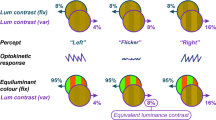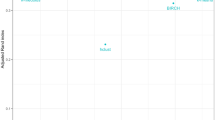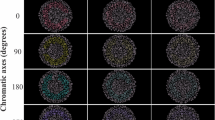Abstract
Vernon and Straker1 claim that 5·37–9·45 per cent of colour blind men were found in Great Britain, according to district, averaging 7·49 per cent. This is about twice the accepted figure. They suggest the difference is due to use of "a modified form" of the Stilling and Ishihara Tests, which "picks out many of the colour-weak, or anomalous trichromats, as well as the strictly colour-blind".
This is a preview of subscription content, access via your institution
Access options
Subscribe to this journal
Receive 51 print issues and online access
$199.00 per year
only $3.90 per issue
Buy this article
- Purchase on Springer Link
- Instant access to full article PDF
Prices may be subject to local taxes which are calculated during checkout
Similar content being viewed by others
References
NATURE, 152, 690 (1944).
NATURE, 153, 409 (1944).
Edridge Green, F. W., "The Physiology of Vision", chapter 24.
Houstoun, R. A., "Vision and Colour Vision", 194–199.
Cf. Thomas, G. J., Amer. J. Psych., 56, 583.
Author information
Authors and Affiliations
Rights and permissions
About this article
Cite this article
PICKFORD, R. The Ishihara Test for Colour Blindness. Nature 153, 656–657 (1944). https://doi.org/10.1038/153656b0
Issue Date:
DOI: https://doi.org/10.1038/153656b0
This article is cited by
-
Colour Vision of Heterozygotes for Sex-linked Red-Green Defects
Nature (1949)
-
Darkening of Red in Protanopes
Nature (1948)
-
Multiple Allelomorphs in Colour Vision
Nature (1948)
Comments
By submitting a comment you agree to abide by our Terms and Community Guidelines. If you find something abusive or that does not comply with our terms or guidelines please flag it as inappropriate.



